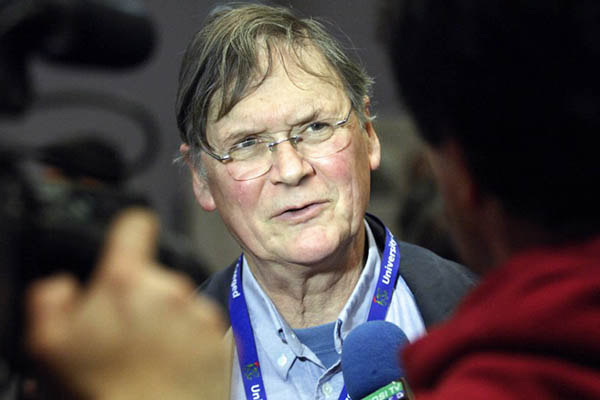
Csaba Segesvari—AFP
Tim Hunt had claimed female scientists shouldn’t work with male counterparts because ‘they fall in love.’
British Nobel Prize-winning scientist Tim Hunt has resigned from his post at University College London over controversial comments he made about female scientists.
Hunt, who holds other posts, has apologized for causing offence after suggesting that female scientists could not take criticism without crying, and that relationships between men and women in the laboratory disrupted work. The 72-year-old said Wednesday his comments, made at a lunch for women attending the World Conference of Science Journalists in South Korea, were intended to be light-hearted but also “honest.”
University College London said that Hunt had resigned from his unpaid, non-teaching position as honorary professor with the UCL Faculty of Life Sciences. “UCL was the first university in England to admit women students on equal terms to men, and the university believes that this outcome is compatible with our commitment to gender equality,” it said.
Hunt shared the 2001 Nobel Prize in Physiology or Medicine for the discovery of protein molecules that control the division of cells.
“Let me tell you about my trouble with girls,” Hunt was reported as saying in South Korea. “Three things happen when they are in the lab: you fall in love with them, they fall in love with you, and when you criticize them they cry.” He also called himself a “chauvinist pig.”
Speaking to BBC radio, he admitted making the comments but added: “I’m really sorry that I said what I said. It was a very stupid thing to do. What was intended as a sort of light-hearted, ironic comment was apparently interpreted deadly seriously. It’s terribly important that you can criticize people’s ideas without criticizing them and if they burst into tears it means that you tend to hold back from getting at the absolute truth. Anything that gets in the way of that diminishes, in my experience, the science.”
Dorothy Bishop, professor of developmental neuropsychology at the University of Oxford, said: “In one short speech he has set back the cause of women in science. The comments get at the heart of bias against women in science: the notion that we can’t be serious contenders because we are too emotional—and, even worse, we distract the men from their science by our sexual allure.”
The most recent figures from UNESCO reveal that although women outnumber men in university science courses, by 55 percent to 45 percent, relatively few pursue careers in research. Some 47 percent of doctoral science students are women, and this falls to 38 percent among researchers.
The Royal Society, a fellowship of some of the world’s most distinguished scientists that includes Hunt, distanced itself from the Nobel laureate following his remarks. “In order to achieve everything that it can, science needs to make the best use of the research capabilities of the entire population,” it said. “Too many talented individuals do not fulfill their scientific potential because of issues such as gender, and the society is committed to helping to put this right.”
